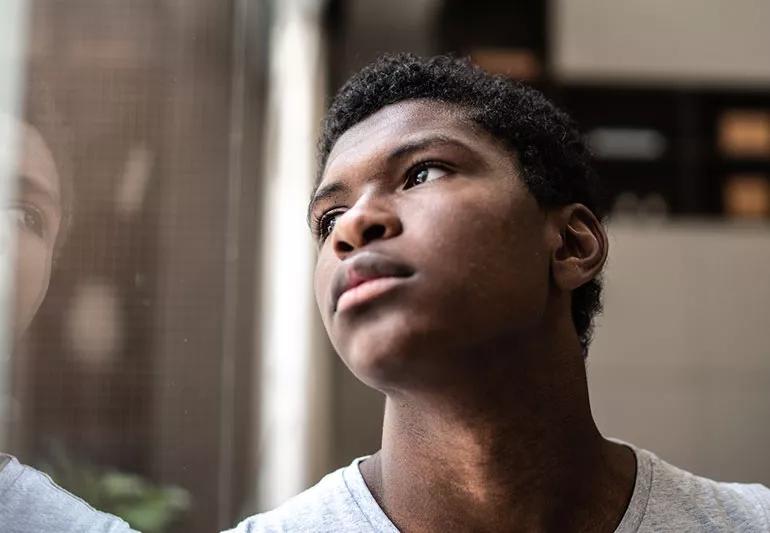Timing will vary, but stages of development shouldn't

A cracking voice. Wild growth spurts. A little facial hair sprouting on the chin. Welcome to puberty for boys, a rite of passage that bridges the gap between childhood and manhood.
Advertisement
Cleveland Clinic is a non-profit academic medical center. Advertising on our site helps support our mission. We do not endorse non-Cleveland Clinic products or services. Policy
The stages of male puberty follow a definite path with a progression of physical changes. The timing of these changes, however, varies widely from person to person.
Let’s look at the process with adolescent medicine specialist Veronica Issac, MD.
Boys tend to begin and end puberty sometime between age 10 and 18. (That’s about two years later than girls.) Black and Hispanic children tend to enter puberty a bit earlier than white children.
A tool called the Tanner Stages outlines the stages of puberty for boys (and girls), and when they’re likely to occur. For parents, they can serve as an excellent guide to the changes you can expect to see.
Here are the five stages of puberty for boys and the signs of each.
In this “prepubescent” stage, boys have not experienced visible changes. Their brain, however, is starting to send signals about what’s ahead.
In this stage, typically beginning between age 9½ and 14½, boys experience:
In this stage, occurring between age 10 and 16½, boys experience:
Advertisement
“Some breast development, or gynecomastia, may occur in about 50% of all teenage boys, but it typically resolves by the end of puberty,” notes Dr. Issac. “If this becomes an issue physically or socially, suggest that your son talks with his healthcare provider.”
In this stage, which can occur between ages 11 and 16½, boys experience:
Boys finish their growth and physical development during this stage. Many may not develop facial hair until this step in the process. Most boys finish growing by age 17.
Don’t hesitate to talk to your pediatrician when you have concerns about your son’s progress through puberty, says Dr. Issac. A physical exam and other tests will help to rule out problems, pinpoint underlying issues or provide you with reassurance.
Whenever your son enters puberty, you can expect to see some emotional upheaval. Increased testosterone coupled with social pressures may cause moody behavior, emotional outbursts and family discord.
Parents can typically ride out these issues. (Read what a pediatric psychologist says about talking to your teen.)
“However, if serious emotional problems arise — if your son doesn’t want to do the things he usually enjoys, or hang out with his friends or experiences a drop in grades — it’s important to have him evaluated with his pediatrician,” says Dr. Issac.
Emotional issues could be a sign of a mood disorder or other psychological concerns, notes Dr. Issac. Medication and/or therapy may be useful in these instances.
Not everyone is on the same timetable. Some boys begin to see changes very early, which is called precocious puberty. Others may not see changes until later, which is often referred to as delayed puberty.
Let’s look at each situation.
If your son shows signs of puberty before turning 9, visit the pediatrician. This may signal a pituitary problem or neurological issue, notes Dr. Issac. The doctor should evaluate your son as soon as you suspect a problem.
Possible causes for early puberty include:
Advertisement
If the problem is hormonal, an endocrinologist can prescribe medication to halt puberty until the time is right. If your doctor suspects another problem, your son may be referred for further testing.
If your son starts puberty after age 14 or isn’t progressing through puberty, you’ll also want to check with your doctor. “Often the child is merely a late bloomer — particularly if dad was as well,” says Dr. Issac.
But hormone or endocrine abnormalities can also delay puberty. If your doctor suspects an underlying problem, your son will likely be referred to a specialist for more testing.
Advertisement

Sign up for our Health Essentials emails for expert guidance on nutrition, fitness, sleep, skin care and more.
Learn more about our editorial process.
Advertisement

Timing varies, but changes typically occur in the same order

Infants are at high risk of severe RSV, but getting the vaccine during pregnancy helps protect them from it

This common sitting position for kids can cause problems with joint health, muscle development and motor coordination

When baby teeth get damaged, these procedures can relieve pain and save space for adult teeth

Most kids start losing baby teeth around age 6 — but there’s some wiggle room in the timeline

From playful movement to strength-building, kids need exercise to stay healthy and strong

Start weaning your toddler off daytime pacifier use by 12 months old to help prevent dental issues and speech delays

Combat summer learning loss and keep young brains engaged with low-pressure learning

Even small moments of time outdoors can help reduce stress, boost mood and restore a sense of calm

A correct prescription helps your eyes see clearly — but as natural changes occur, you may need stronger or different eyeglasses

Both are medical emergencies, but they are very distinct events with different causes